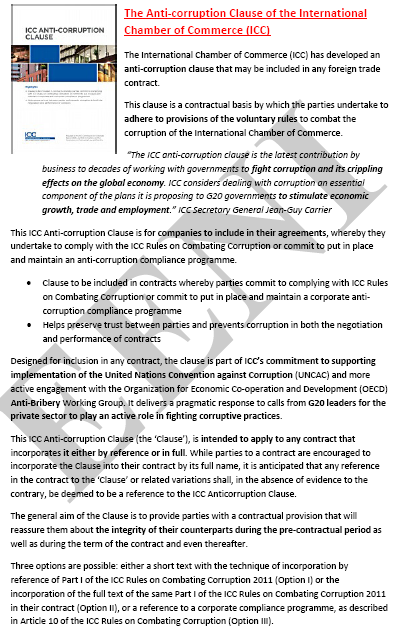
Anti-corruption Clause (ICC Chamber of Commerce)
How to implement the ICC Anti-corruption Clause. Self-regulation
- Introduction to the International Chamber of Commerce
- The Anti-Corruption Clause of the International Chamber of Commerce
- How to implement the anti-corruption clause
- Outline of the anti-corruption clause
Sample - Anti-corruption Clause of the International Chamber of Commerce


The Subject “Anti-corruption Clause of the ICC” belongs to the following Online Programs taught by EENI Global Business School:
Course: No to Corruption in International Business.


Masters: International Business, Foreign Trade.
Languages:  (or
(or  Cláusula Anticorrupción
Cláusula Anticorrupción  Clause ICC Anti Corruption).
Clause ICC Anti Corruption).
In 1919 (Paris, France) was created one of the largest business Organizations in the World: The International Chamber of Commerce (ICC).
One of the objectives of the International Chamber of Commerce is to promote the open trade and investment, creating instruments for the companies such as the Incoterms, the Uniform Customs and Practice for Documentary Credits (URU), standard contracts, codes of good practice or the anti-corruption clause.
- The ICC also creates the International Court of Arbitration
- The International Chamber of Commerce consists of companies and Organizations in more than 130 countries
The International Chamber of Commerce has developed an anti-corruption clause that may be included in any foreign trade contract.
This clause is a contractual basis by which the parties undertake to adhere to the provisions of voluntary rules to combat corruption of the International Chamber of Commerce.
The anti-corruption clause serves both for Small and Medium Enterprises and large multinationals.
An exporting company wishing to include the anti-corruption clause in their international sales contracts does not need any permission from the International Chamber of Commerce.
The anti-corruption clause is based on the principle of self-regulation. The acceptance of the Anti-corruption Clause is voluntary by the involved companies.
The only restriction is that the interpretation of this clause corresponds to the International Chamber of Commerce.
FIATA Transport Documents and the International Chamber of Commerce
- FIATA FBL: UCP 600
- FIATA FWB: UCP 600
- e-Bill of Lading
- FIATA FCR: UCP 600 (articles 19 to 25)
- FIATA FCT: UCP 600
- FIATA FWR: not defined in UCP 600
The International Chamber of Commerce created the International Bureau of Containers and Intermodal Transport (BIC).
(c) EENI Global Business School (1995-2024)
We do not use cookies
Top of this page



